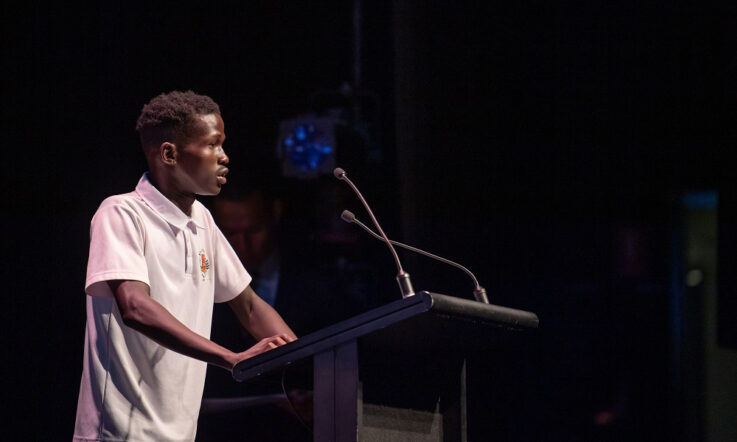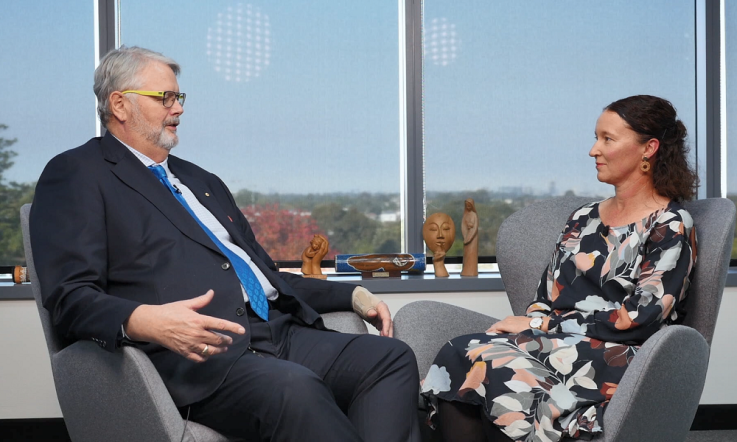Before we jump into this episode, are you subscribed yet to the free weekly Teacher bulletin? Get a weekly wrap of our latest content straight to your inbox. Join our community by clicking on the sign-up button at our website, teachermagazine.com.
Hello and thanks for downloading this podcast from Teacher – I’m Jo Earp. My guest for Episode 90 of The Research Files is Dr Sharon Wagner, a casual academic and researcher at Western Sydney University. She recently co-authored a book chapter with colleague Professor Loshini Naidoo titled Engaging parents of refugee backgrounds in their children's education: insights from Australia. This particular chapter draws on data from 2 different Australian studies, covering Victoria, New South Wales and Tasmania, and importantly the participants were families and educators – so there’s a really interesting exploration of the topic from those differing perspectives. So, we’ll be chatting about things like parent-teacher interviews, education jargon, language barrier, system expectations and lots more. Now, I’ll pop a link to that book chapter, and also a full reference, in the transcript of this podcast over at teachermagazine.com if this whets your appetite and you want to read in more detail. I hope you enjoy the episode.
Jo Earp: Hi Sharon, thanks very much for joining us at Teacher today. Now, the teachers and the school leaders listening – and of course the parents and the families as well – they'll know what an important time school transition is. And that could mean all kinds of things – whether it's starting school, helping students to settle into those new routines and places and learning expectations, or indeed moving from primary years up to secondary, where again, there are those routines that change, there's the different spaces and expectations and teachers and so on. And the other aspect is transition can also be students joining a new school at the start of an academic year or during term time. Now, your work specifically focuses on transition to school for refugee students and their families, doesn't it? Why did you want to look at this area of education research in particular?
Sharon Wagner: Yeah, well, I think my interest in education transition has slowly evolved over the years. So, it's based really on different personal and professional experiences. So, I've lived overseas with my family for many years, and so I've some personal insights as a parent. So, I know, for instance, what it's like to be a young mum in a non-English speaking country trying to support my children's learning and not always understanding school expectations. But I've also had the privilege of working in Australia as a teacher in a university English preparation course, and I got to know many people from refugee backgrounds there. Class discussions often highlighted some of the challenges that they faced in Australia, such as language learning, or different cultural misunderstandings, or even uncertainty about how to support their children's learning in a different country.
And so, through these issues that I’ve reflected on, I've started to think about this whole transition process; and it's not just refugee background families who are adjusting to changes in their new country, but also educators in Australia who are adjusting to just the changing demographics in their school communities. So, my research is, really, I've tried to get insights from both parents from refugee backgrounds as well as Australian educators. And I've had the privilege to work together with Professor Loshini Naidoo, who has a lot of experience in this field, and she's co-authored a book chapter with me focusing on this topic.
JE: Yeah, you mentioned that you're at Western Sydney University, you're a casual academic and researcher there and, like you say, you've co-authored this book chapter with a colleague at WSU, Professor Loshini Naidoo; that's on the topic of engaging parents of refugee backgrounds in their children's education (Wagner & Naidoo, 2023). Before we look at some of the findings, just as you were saying there it’s not just the students coming in, it's the teachers as well. And you're advocating that as a starting point, schools and families, really, they need to be learning from each other first, don’t they?
SW: Yes, that's right, Jo. When parents and educators come from different cultural backgrounds, there can be a tendency just to focus on differences – like different language or different cultural norms – and there may even be an expectation that newcomers need to adjust to our way of doing things. But, one of the key points that we argue in the book chapter, that parents and educators who come from different cultural backgrounds need to negotiate their differences.
They can do this by sharing information so that they can build knowledge of each other, and of the child. For instance, educators can provide insights into the Australian Curriculum and expectations, and parents from refugee backgrounds can share from their knowledge and experience about their children. In this way, both the educators and families can learn from each other.
One of the Victorian educators who was interviewed suggested that schools need to be ‘ongoing learning institutions’. She felt that in addition to teaching education, educators have to also be learners.
JE: We're going to explore some of the issues associated with transition and successful student learning (of course that's the aim) from the perspective of parents and families, but also those teachers and school leaders that you spoke to, as well. First up then, parent teacher meetings, I thought that was a really interesting one. What were the teachers, first of all, saying about this in relation to, in particular, refugee background parents. And then, what were the comments from the parents’ side of things?
SW: Yes, well, this is a very interesting part of our research. So, for example, some of the participating educators from NSW and Victorian schools expressed quite a deal of frustration that many refugee background parents failed to attend parent teacher meetings. And they’d sent out invitations, inviting all families to attend, but there was a lack of attendance. But then this raises some questions about whether all parents could understand the invitations that were written in English; and that could have possibly been an issue. Maybe some of the parents were not even aware of the parent teacher meeting and that's why they didn't attend? Some of the participating refugee background parents from these schools felt that they didn't have sufficient time at the parent teacher meetings to discuss issues. So, there was quite an imbalance between the educators’ views and the parents’ views.
Then in Tasmania, it was slightly different. The educators there explained that most refugee background parents didn't have adequate English language skills to attend the mainstream parent teacher meetings in English. So, they organised what they referred to as ‘EAL parent-teacher meetings’ where the EAL teacher explained school information and there was an interpreter there to provide an overview of the child's report. But then, of course, the parents didn't get a chance to talk with the subject teachers, and this was something that the parents who participated in our study mentioned – they really would have liked to meet individually with the children's teachers so they could learn about their child's progress.
JE: Oh, so they were kind of grouped, really, weren't they? And then an interpreter would be able to them through that. Which is of course, you know, an improvement on not being able to access at all, but there's still some way to go there isn't there? And they’re saying ‘well, yeah, we’d like to have the same type of access as everybody else’. As a solution to this then, some of the some of the parents actually came up with a different idea, didn't they?
SW: Yes, that's right. Well, some of the parents, especially from Victoria and NSW schools, they suggested that instead of just going to the school and having a quick chat with the teachers at the parent-teacher meetings, they would really have preferred to have events that targeted their needs, specifically, how to support their children's learning. So, they suggested maybe workshops with a focus on engaging with homework content, or something to help them learn English, or computer skills – so, things to prepare them better to support their children.
JE: So, another topic that came up in the focus groups and interviews that you did was the teachers themselves actually being concerned about the jargon that schools use. I've been a teacher myself; we all know the different acronyms and all kinds of bits and pieces that you say as a teacher, and also the large amount of information that gets sent out to parents as well.
SW: Yeah. So, communicating with parents is a difficult balancing act. It's balancing between giving out too much information or too little information. So, some of the participating teachers felt that they were, well, they expressed concern about the complexity of written school information – so the use of terminology or abbreviations or acronyms, as you mentioned, that can really limit the effectiveness of the message. And if parents can't understand what's been written, it's not surprising that they're not going to respond appropriately.
Some of the participating educators also felt that there tended to be too much information sent to the parents. So, whereas many English-speaking parents might be able to just skim through the details and then find the pertinent points, this is not a skill that all parents possess. If they are unable to read the information sent from the school, it may result in some parents being unaware of important information that affects their child. This is also what we were talking about previously – if parents haven't read about a parent teacher meeting, for example, they're less likely to attend it. So, it does have a big impact if they can't understand all the information that's sent to them.
JE: And there's also the technology aspect of that. There's been a real shift in recent years, and even more so really, since COVID to online platforms, not just for updates but general communication as well and booking things and all, you know, feedback and all sorts of things. What they were saying in the focus groups and the interviews with children are doing the translating for the parents and the parents, and the teachers were saying, well, you know, they're the ones, they're the ones choosing what to pass on and what not. They're the ones making the decisions about what's important and maybe themselves missing out on some of the detail or the nuance.
SW: Yes, yeah, exactly. So, as you know, parents with children in schools today in Australia are often expected to take advantage of this online school information. But there are some factors that can affect the capacity of parents to even access online platforms – like, it can be limited to the financial capacity of the parents to even purchase the equipment, such as laptops or computers, or to pay for the internet usage. And it can also mean that some parents can't use technology – like, they may not know how to send emails or download documents, so there's a need for digital literacy. Added to all this there’s the written information – if they can't read or understand it, there's a problem in accessing the information.
So, all of these things can often lead to a bit of a reliance on children, maybe, to convey the school information as you were mentioning, especially if the parents are less proficient in English or if they have limited technological experience. But this can actually lead to more issues within the refugee background family, such as a blurring of the roles between, you know, the role of the parent, the role of the child, who is doing what.
One of the Tasmanian educators explained the children tend to take charge and decide what information is important to convey to their parents. And some of the parents and the teachers who participated explained that some children may choose what information to tell their parents, and perhaps what they don't want their parents to be aware of. So, there's quite an issue with this, if parents can't get the full information and only getting filtered information.
JE: Yeah, I was just thinking there as you were speaking – when we ask children to translate as well, you know, you can be talking about really young children sometimes who maybe don't even have the right grasp on what's being said in the first place. And so, they're translating something that maybe they don't quite again understand the nuance of it, you know, not intentionally but, yeah …
SW: Because the children are also learning, often learning, English as well, so it is putting an extra pressure on them as well, which is not necessarily fair.
JE: Yeah. And you found that some parents were going to, you know, quite extended lengths to try and overcome the language barriers, didn't you?
SW: Yes, well, most of the parents that we talked to were actually undertaking English language study of some description, but then obviously this takes a long time, you can't learn a language in a few months. It takes considerable effort and time. And some parents even hired an interpreter to make sure that they could communicate effectively with their child's teacher. But then of course this is a significant financial outlay, and most parents would not be able to afford something like this.
JE: Yeah, that's quite an extra outlay, isn't it to engage with the school, it shows you how much they were worried about that, some of the parents. I want stick with the parent feedback here for a moment, you spoke with them about the expectations of the Australian education system. You mentioned it there in your first answer about yourself being, you know, in a different education system and not quite understanding the expectations. So, you spoke to the parents in your study about how these norms differ from their own experience. What did you find there?
SW: Well, prior educational experiences do shape perceptions that parents and the teachers have, regarding what the roles are of the parent and the teacher and the expected behaviour within the school context. So, for example, some of the participating parents constructed the teachers as experts in the educational field, and so because of this, they didn't feel free to ask questions in case it appeared that they were doubting the teacher’s expertise. And other parents didn't want to offend the teacher, and they thought that maybe their comments might have a negative impact on their child's classroom experiences.
In contrast, some of the educators actually did tend to, well, sounded like they took on the role as an educational expert, mostly because they saw the refugee background parents maybe trying to support them because of their limited English or their IT, low educational qualifications, or their lack of knowledge about the Australian Curriculum. So, in this way they were trying to support them, but indirectly they were acting as an expert in the field.
Then, at the same time, some of the educators highlighted that parents in Australia should actually play an active role in their children's learning. And this concept of an active role or active parenting came up quite often, and this was linked to the idea of initiating contact with the school regarding their child's progress. But this is really based on an assumption that all parents can equally advocate on behalf of their child, and it doesn't really take into consideration that parents are differentially positioned within the school community, you know, because of cultural, linguistic and educational factors.
So even though some of, well, I would say even though the refugee background parents may hold high aspirations for their children's educational success, they still needed to learn what's expected of them as parents within the Australian school context.
JE: So, there are a lot of things that go on and there's a lot of things that are unexplained and a little bit difficult to grasp in the beginning, and then there's obviously the language barriers. There's a lot mounting up here as to some of those issues and it's difficult, isn't it, from both sides. They were also worried, then, the parents were worried about their own capacity, weren't they, to help their children as well?
SW: Yeah, well, often, especially with the Tasmanian parents, they highlighted, maybe their low educational opportunities in the past. And these differences in educational opportunities can influence how parents can engage in their children's learning after settlement.
So, some of the parents felt that their own lack of education limited their ability to support their children's learning. So, one father, for instance, explained that parents can't help their children with their studies if they haven't already learnt it by themselves. Some other parents referred to drawing on previous knowledge to support their children with homework. So, for example, using their home language to explain at home how to do homework. But, at the same time, many of the parents still said that they felt uncomfortable if they had to meet with the children's teachers at school, because they just couldn't express themselves in English.
Many of the parents have adopted what has been described as ‘invisible strategies’ to support their children's learning. So, many of the parents emphasised the importance of a positive and encouraging family environment and prioritising education at home. And so, some of the things they did – they limited household tasks so their children could focus on study, and they also stressed the importance of helping their children to be respectful and well behaved because they saw that appropriate behaviour at home might transfer to the school context and enable their children to concentrate and then take full advantage of their future educational opportunities.
JE: From everything that we've been saying, you know, it's clear that they all do value each other's input and they all care, they deeply care – it's just trying to find some way to make it work. With all of that in mind, then, what would you like to see happening in schools? And I'm also interested about what you think about future research in this area.
SW: Hmm, yeah, I think at the school level there needs to be ongoing evaluation to ensure that parental engagement strategies and practices truly reflect the needs of the school community. So, thinking about things like written communication, parent teacher interviews, for example – how can we make those applicable to as many parents as possible?
And educators also need to be adequately prepared in their initial teacher training, but also in ongoing professional development so that they can communicate in culturally appropriate ways with parents from refugee backgrounds and even have the time to listen to what parents from refugee backgrounds are trying to say.
And even as we discussed at the beginning of the interview, I feel that educators and refugee background parents need to value and learn from each other's knowledge and experience. So, I think it would really be great if we could have some more research drawing out details about some of the effective approaches that have been implemented in different school sites so that we can continue to learn from each other.
JE: Well, we will certainly [keep] an eye out for that research, hopefully it's forthcoming and we can get some strategies there. But that's been really interesting to go through the work that you've done and best of luck for your future work in this area. For now, though, Dr Sharon Wagner, thanks very much for sharing your expertise with The Research Files.
SW: Thank you very much.
That’s all for this episode, thanks for listening. If you want to keep listening now, you can access more than 300 episodes in the Teacher archives – just head over to teachermagazine.com, or wherever you get your podcasts from. There’s plenty there to keep you busy, including more from The Research Files, episodes from our Behaviour Management, School Improvement, Global Education, Teaching Methods and Action Research series, plus our monthly Staffroom podcast where you can listen, pause and reflect with colleagues.
Before you go, are you currently subscribed to the weekly Teacher bulletin? It’s a free weekly wrap of our latest content straight to your inbox. Join the more than 40,000 educators who are already part of the community by clicking on the sign-up button at our website, teachermagazine.com.
References
Wagner, S., & Naidoo, L. (2023). Engaging parents of refugee backgrounds in their children's education: insights from Australia. In S. Subasi Singh, O. Jovanoic, & M. Proyer (Eds.), Perspectives on Transitions in Refugee Education: Ruptures, Passages, and Re-Orientations (pp. 175-189). Verlag Barbara Budrich. https://doi.org/10.2307/j.ctv32bm1gz.15
Reflect on some of the issues and suggestions discussed by both the parent and educator participants in these Australian studies. How does this compare to your own context? What areas could you and your school improve on in order to make parent-school and parent-teacher relationships stronger and more effective in supporting student outcomes?



